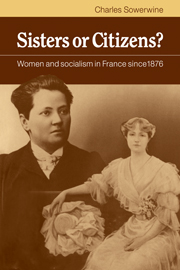Book contents
- Frontmatter
- Contents
- Preface
- Abbreviations of organisations
- Bibliographical abbreviations
- Introduction
- Part I Feminism and socialism 1876–1900
- Part II Origins of the socialist women's movement 1899–1914
- Part III Development and decline of the socialist women's movement 1914–79
- Conclusion
- Appendix 1 The Second International and the woman question 1889–1904
- Appendix 2 French socialist women in figures
- Appendix 3 Elisabeth Renaud and the Cambier affair
- Notes
- Bibliography
- Index
Appendix 3 - Elisabeth Renaud and the Cambier affair
Published online by Cambridge University Press: 07 October 2011
- Frontmatter
- Contents
- Preface
- Abbreviations of organisations
- Bibliographical abbreviations
- Introduction
- Part I Feminism and socialism 1876–1900
- Part II Origins of the socialist women's movement 1899–1914
- Part III Development and decline of the socialist women's movement 1914–79
- Conclusion
- Appendix 1 The Second International and the woman question 1889–1904
- Appendix 2 French socialist women in figures
- Appendix 3 Elisabeth Renaud and the Cambier affair
- Notes
- Bibliography
- Index
Summary
Renaud's decision to resign from the SFIO in January 1914 was the result of the Cambier affair, known at the time as the ‘Affaire du Grand Air’. This was a dispute between Achille and Gabrielle Cambier on the one hand, and the party hierarchy on the other, about the status of a party summer camp called the ‘Grand Air’. The camp was founded in 1909. For tax reasons, it was put in the name of an independent board with the understanding that it really belonged to the party. Gabrielle Cambier was director of the camp. At the end of 1911, she was removed as director after numerous disputes with the board. In turn she claimed that certain members of the board, among them a number of leading socialists, were trying to run the camp for their own profit. They then accused her of having ruined the finances of the camp. She brought suit for defamation.
The dispute had political ramifications. The Cambiers were militants on the non-Hervéist extreme left of the party. In May 1913, they began publishing a weekly, La Lutte de classe, to defend themselves and to continue their battle against the SFIO's electoralism and collaboration with bourgeois parties. Renaud and Jean Allemane were among its collaborators from the beginning. The national council of the party, at its plenary meeting in July, passed a resolution asking militants not to collaborate with the Cambiers' journal because they were using ‘disloyal’ tactics.
- Type
- Chapter
- Information
- Sisters or Citizens?Women and Socialism in France since 1876, pp. 202 - 205Publisher: Cambridge University PressPrint publication year: 1982



